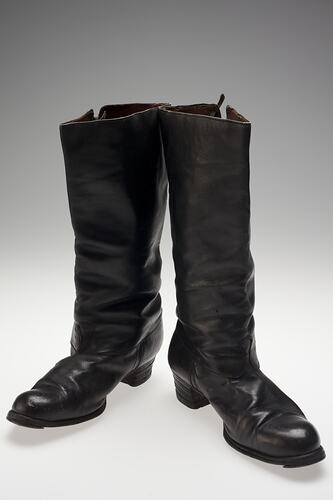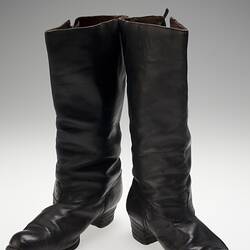Anton Abrat was born on 21 November 1917 in Pereris, a village outside Stanislav (now Ivanov-Frankivsk) in the Khersonska region in southern Ukraine. He completed primary school and trained as a blacksmith. Anton owned a forge and also employed a couple of men, so was relatively well-off in his community. At the outbreak of World War II he was in the Polish army, as Ukraine was then under Polish rule. After Ukraine was invaded by Germany (having been occupied first by Russia), Anton escaped and ended up as a forced labourer in Germany. After the War he worked as a truck driver for the Americans.
Parania Abrat was born on 5 July 1923 in Posich, a village outside Stanislav. It is not known whether she and Anton knew each other before the War or if they met in Germany. Parania's family did not allow her to attend school as it was her job to look after the geese in the fields. Nevertheless, she was an innately intelligent woman. In 1941 she was drafted into forced labour in Germany where she worked on a farm and was well treated, eating the same food as the family and given vouchers to buy clothes and shoes at Christmas.
Parania and Anton were married in a civil ceremony and their first son Wasyl was born on 22 March 1944. Parania and Wasyl lived in a refugee camp. As with the majority of Ukrainian refugees, most refused to be repatriated to Ukraine. 207,000 Ukrainians avoided repatriation and most eventually migrated to North and South America. Australia was the first country to offer Ukrainian refugees entry, having admitted 21,000 by 1964 (although there would have been many more registered under other nationalities).
Anton pretended to be single in late 1948 so that he would be favourably considered as a refugee by Australia which was interested in employing single men. He was sent to work with the Forestry Commission as a blacksmith in Noojee in Gippsland (most Ukrainians during this time were sent to holding centres near regional towns and under two year compulsory work contracts), and he then applied for permission for his wife and child to join him. Parania and Wasyl arrived in Australia on 17 August 1949, a day Wasyl continues to celebrate. The couple had another son who was born in Australia. Wasyl took Parania back to the Ukraine in 2002 but Anton, fiercely anti-communist, has had no interest in returning to Ukraine. Neither Anton or Parania like to talk about their past.
Two pairs of traditional Ukrainian folk costume boots were brought to Australia by Parania in 1949. They were worn occasionally during their early years in Australia at events when the couple wore traditional Ukrainian costumes. Boots tended to be red or black, depending on the regional dances being performed. Wasyl recalls in particular the Ukrainian Christmas choirs at the Good Neighbour Christmas celebrations in Warragul during the mid 1950s. Later, Anton and Parania became Jehovah's Witnesses and withdrew from such celebrations.
More Information
-
Keywords
Cultures and histories : Melbourne and Victoria, Ukrainian Immigration, Immigration Selection, Immigration Policies, Immigration
-
Authors
-
Article types

